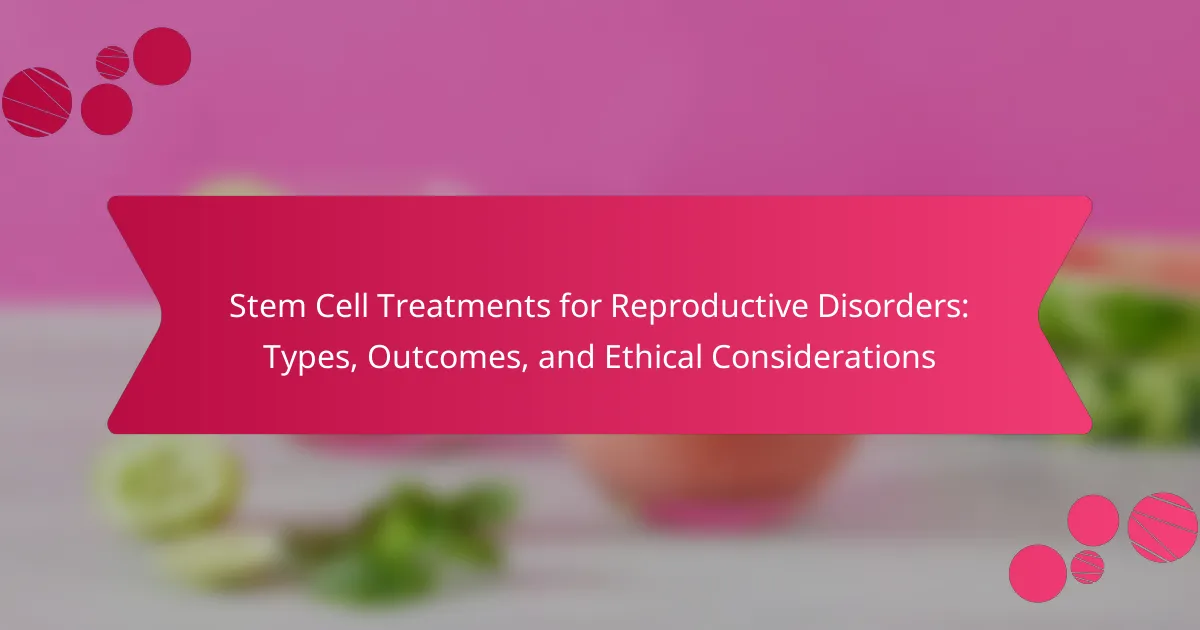Stem cell treatments for reproductive disorders offer promising solutions for improving fertility and restoring reproductive function. This article explores various treatment types, including autologous and induced pluripotent stem cell therapies, along with their unique outcomes. It also addresses the ethical considerations surrounding the use of stem cells and the impact on patient experiences. Recent advancements in stem cell research further highlight the potential for innovative approaches to address infertility and reproductive health challenges.
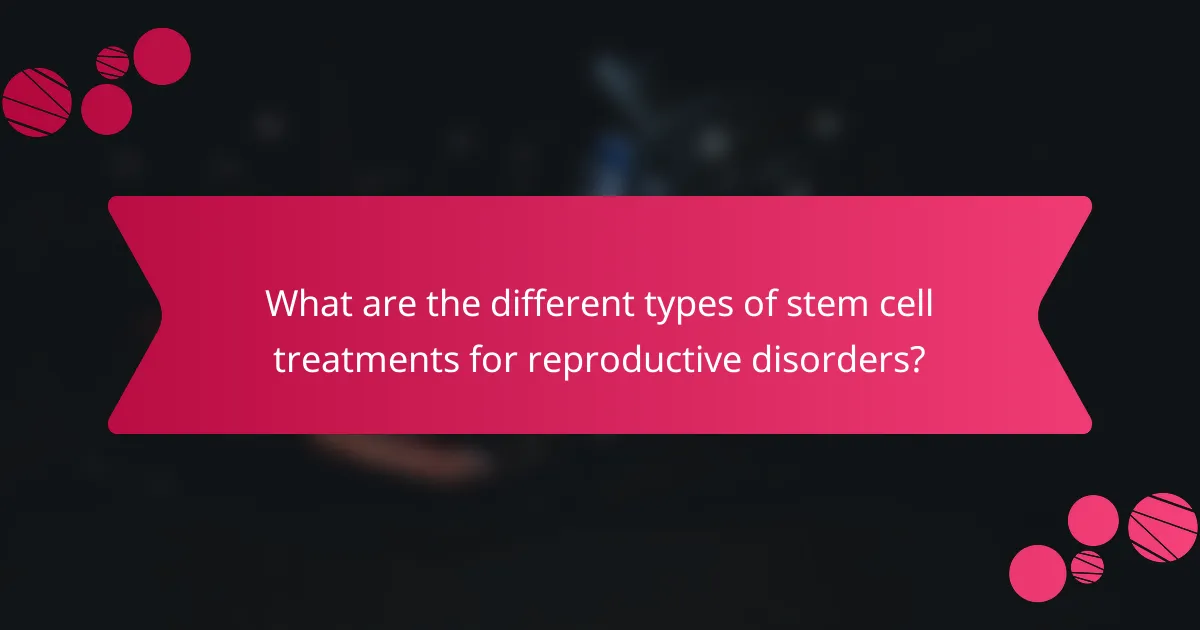
What are the different types of stem cell treatments for reproductive disorders?
Stem cell treatments for reproductive disorders include various types such as autologous stem cell therapy, allogeneic stem cell therapy, and induced pluripotent stem cell therapy. Autologous stem cell therapy uses the patient’s own cells, minimising rejection risks. Allogeneic stem cell therapy involves donor cells, which can provide a broader range of genetic diversity. Induced pluripotent stem cell therapy reprograms adult cells to behave like embryonic stem cells, offering new avenues for treatment. Each type has unique outcomes and ethical considerations, influencing patient choices and treatment efficacy.
How do embryonic stem cells contribute to reproductive health?
Embryonic stem cells enhance reproductive health by offering potential treatments for infertility and reproductive disorders. These cells can differentiate into various cell types, enabling the regeneration of damaged tissues and organs involved in reproduction. Research indicates that stem cell therapies may improve ovarian function and restore sperm production, contributing to better reproductive outcomes. Ethical considerations surrounding their use focus on sourcing and the implications of manipulating human life, making informed dialogue essential in advancing this field.
What role do adult stem cells play in treating infertility?
Adult stem cells offer potential in treating infertility by regenerating damaged reproductive tissues. These cells can differentiate into various cell types, enhancing ovarian and testicular function. Research indicates they may improve outcomes in conditions like premature ovarian failure and male infertility. Ongoing studies explore their safety and ethical implications, ensuring responsible application in reproductive medicine.
Which innovative techniques are emerging in stem cell therapy for reproductive issues?
Innovative techniques in stem cell therapy for reproductive issues include the use of induced pluripotent stem cells (iPSCs) and mesenchymal stem cells (MSCs). These approaches enhance the potential for tissue regeneration and repair in reproductive organs. iPSCs can differentiate into various cell types, offering personalised treatment options. MSCs have shown promise in improving ovarian function and fertility outcomes. Research continues to explore gene editing and 3D bioprinting to create more effective therapies. Ethical considerations remain crucial, focusing on consent and the implications of manipulating stem cells.
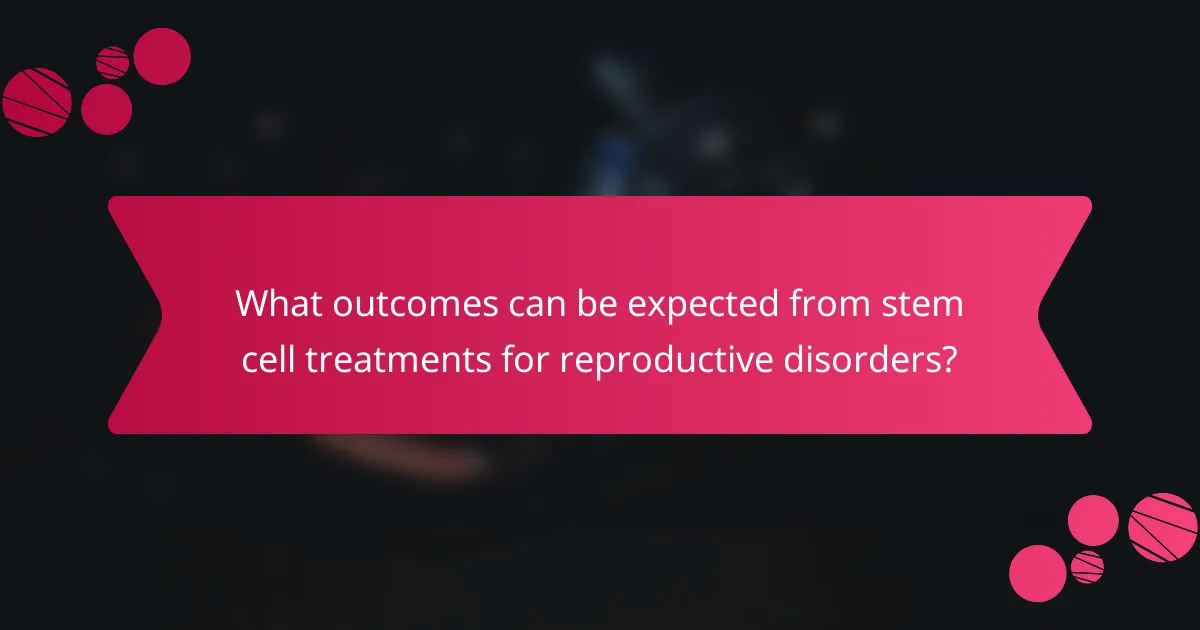
What outcomes can be expected from stem cell treatments for reproductive disorders?
Stem cell treatments for reproductive disorders can lead to improved fertility and restored reproductive function. Outcomes vary based on the specific disorder and treatment approach. For example, studies show promising results in treating conditions like endometriosis and ovarian insufficiency. Patients may experience restored hormonal balance, enhanced egg quality, and increased chances of conception. Additionally, ethical considerations arise regarding the source of stem cells and potential long-term effects on offspring.
How do success rates vary among different types of stem cell therapies?
Success rates for stem cell therapies vary significantly based on the type of treatment. For instance, autologous stem cell therapy shows higher success rates in treating reproductive disorders compared to allogeneic therapies. Factors like the source of stem cells, condition severity, and patient age influence these outcomes. Research indicates that outcomes can range from 30% to over 70% depending on these variables.
What factors influence the effectiveness of stem cell treatments?
The effectiveness of stem cell treatments for reproductive disorders is influenced by factors such as the source of stem cells, the method of delivery, and the patient’s overall health. The type of reproductive disorder also plays a significant role in treatment outcomes. For example, autologous stem cells may yield different results compared to allogeneic sources. Additionally, the timing of treatment and the specific protocols used can affect success rates. Ethical considerations surrounding donor consent and the use of embryonic stem cells further complicate the landscape of these treatments.
What are the long-term outcomes of patients undergoing these therapies?
Long-term outcomes of patients undergoing stem cell treatments for reproductive disorders can include improved fertility rates, enhanced ovarian function, and increased pregnancy success. Studies indicate that outcomes vary based on the type of disorder treated and the specific stem cell therapy used. For instance, patients with premature ovarian failure may experience restoration of ovarian activity, while those with endometriosis may see reduced symptoms. Ethical considerations surrounding these therapies also play a significant role in patient experiences and outcomes.
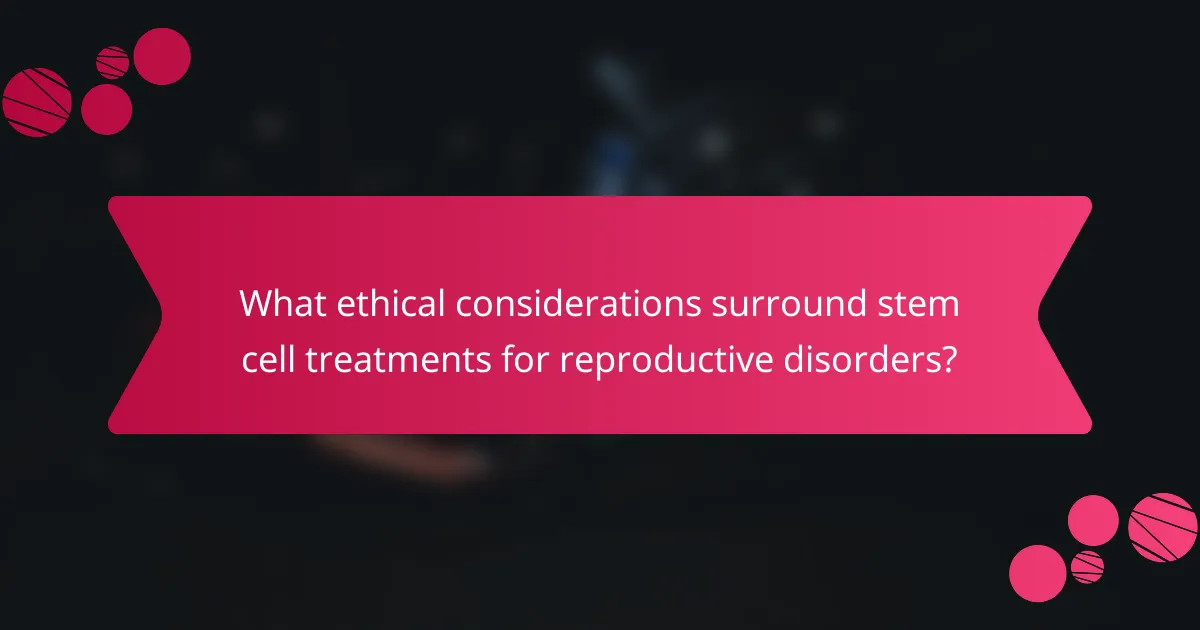
What ethical considerations surround stem cell treatments for reproductive disorders?
Ethical considerations surrounding stem cell treatments for reproductive disorders include concerns about consent, the source of stem cells, and potential exploitation. These treatments often utilise embryonic stem cells, raising debates about the moral status of embryos. Additionally, the accessibility and affordability of these therapies can lead to inequities in healthcare. As a result, ongoing discussions focus on balancing scientific advancement with ethical responsibility.
How do cultural perspectives shape the ethical debates on stem cell research?
Cultural perspectives significantly influence ethical debates on stem cell research by framing moral values and societal norms. Different cultures prioritise various aspects, such as potential benefits versus moral objections. For instance, some cultures may emphasise the healing potential of stem cell treatments for reproductive disorders, while others focus on the sanctity of life. These perspectives shape regulations and public acceptance, affecting research funding and clinical applications. Additionally, cultural beliefs about parenthood and genetic intervention can lead to diverse views on the ethical implications of using stem cells in reproductive health.
What regulations govern stem cell therapies in different regions?
Stem cell therapies are regulated differently across regions. In the United States, the FDA oversees these treatments, ensuring safety and efficacy. In Europe, the European Medicines Agency regulates stem cell therapies under the Advanced Therapy Medicinal Products framework. Meanwhile, countries like Japan have more lenient regulations, promoting research and development in this field. Ethical considerations also vary, influencing the availability and application of stem cell treatments for reproductive disorders.
What are the potential risks and benefits from an ethical standpoint?
Stem cell treatments for reproductive disorders present both ethical benefits and risks. Benefits include potential advancements in fertility and the ability to address previously untreatable conditions. Risks involve ethical dilemmas surrounding the sourcing of stem cells, particularly from embryos, which raises questions about life and rights. Additionally, there are concerns about the long-term effects and the implications of genetic manipulation. Balancing these factors is crucial for ethical acceptance and practice in this evolving field.
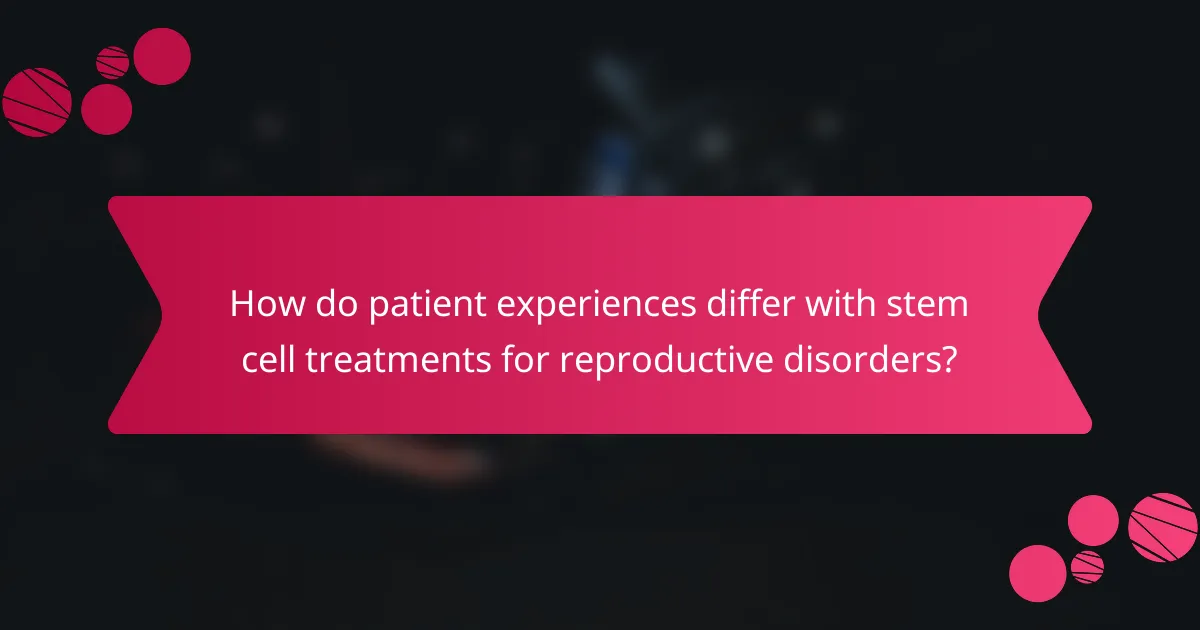
How do patient experiences differ with stem cell treatments for reproductive disorders?
Patient experiences with stem cell treatments for reproductive disorders vary significantly based on individual health conditions and treatment protocols. Factors such as the type of stem cells used, the method of administration, and the specific reproductive disorder impact outcomes.
Patients often report improvements in symptoms, such as enhanced fertility or reduced pain. However, experiences can differ widely; some patients achieve successful pregnancies, while others may not see the desired results. The emotional journey is also notable, with many facing hope and uncertainty throughout the process.
Ethical considerations surrounding stem cell treatments further shape patient experiences. Concerns about the source of stem cells and potential long-term effects can influence patient perceptions and decisions.
Overall, patient experiences are multifaceted, reflecting a blend of medical, emotional, and ethical dimensions in the context of stem cell treatments for reproductive disorders.
What are common patient concerns and expectations?
Common patient concerns regarding stem cell treatments for reproductive disorders include safety, effectiveness, and ethical implications. Patients often expect clear communication about potential outcomes and risks. Concerns about the source of stem cells and the regulatory framework also arise. Patients seek reassurance about the legitimacy of procedures and the qualifications of healthcare providers. Emotional support and comprehensive information are crucial for managing expectations throughout the treatment process.
How do support systems impact patient outcomes in stem cell therapy?
Support systems significantly enhance patient outcomes in stem cell therapy by providing emotional, informational, and practical assistance. These systems can include family, friends, healthcare professionals, and support groups, which collectively contribute to improved mental health and adherence to treatment protocols. Research indicates that patients with robust support networks experience lower stress levels and better overall satisfaction with their treatment journey. Additionally, support systems can facilitate better communication with healthcare providers, leading to more personalised care and better management of expectations.
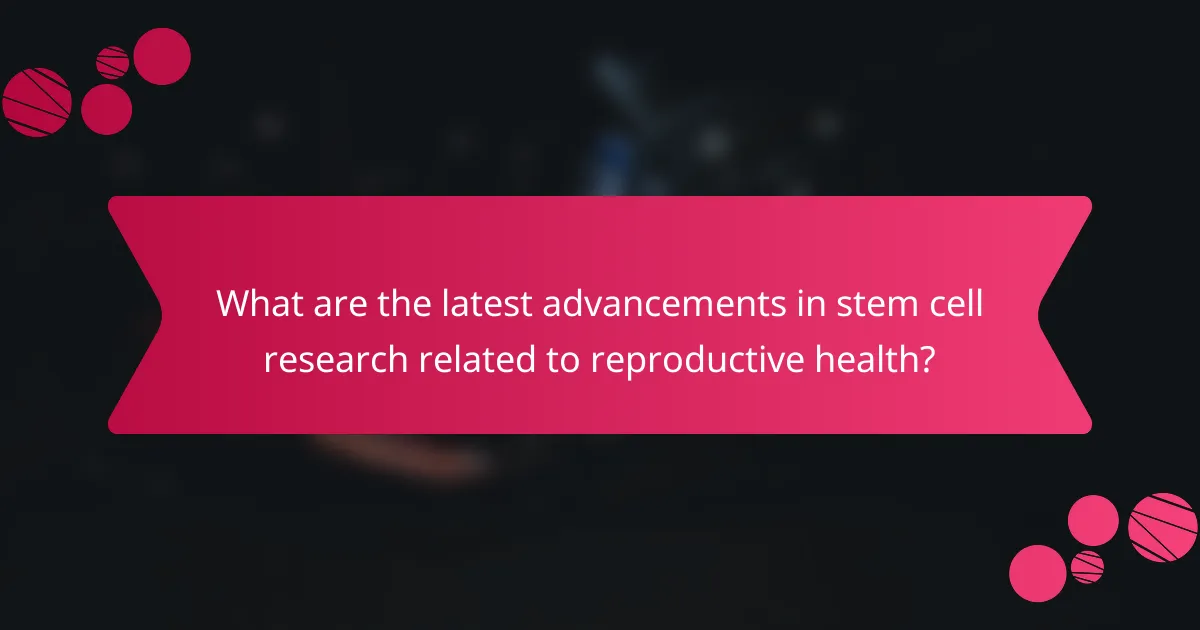
What are the latest advancements in stem cell research related to reproductive health?
Recent advancements in stem cell research for reproductive health focus on improving fertility treatments and addressing reproductive disorders. Innovations include the use of induced pluripotent stem cells (iPSCs) to generate gametes, which may enhance options for individuals with infertility. Additionally, researchers are exploring the potential of stem cells to repair ovarian and testicular tissues, potentially reversing conditions like premature ovarian failure and male infertility. Ethical considerations remain prominent, as the manipulation of human gametes raises concerns about consent and the implications of creating life. Ongoing studies aim to balance scientific progress with ethical responsibilities.
Which clinical trials are currently exploring new stem cell applications?
Several clinical trials are currently investigating stem cell applications for reproductive disorders. Notable studies focus on the use of stem cells to treat conditions such as infertility, endometriosis, and ovarian dysfunction. These trials aim to assess the efficacy and safety of various stem cell types, including mesenchymal stem cells and induced pluripotent stem cells. Outcomes are being measured in terms of improved reproductive function and successful pregnancies. Ethical considerations regarding the sourcing and use of stem cells are also being evaluated to ensure responsible research practices.
What breakthroughs have been made in stem cell technology for fertility preservation?
Recent breakthroughs in stem cell technology for fertility preservation include advancements in deriving gametes from pluripotent stem cells. These developments enhance options for individuals facing infertility due to medical treatments or genetic conditions. Researchers have successfully created oocytes and sperm-like cells from induced pluripotent stem cells, demonstrating promising potential for future reproductive therapies. Ethical considerations continue to shape the discourse around these technologies, particularly concerning the implications of creating life from stem cells.
How is gene editing integrated with stem cell treatments for reproductive disorders?
Gene editing enhances stem cell treatments for reproductive disorders by enabling precise modifications to genetic material. This integration allows for the correction of genetic defects, improving treatment outcomes. Techniques like CRISPR facilitate targeted gene alterations in stem cells, which can then differentiate into healthy reproductive cells. This method holds promise for conditions such as infertility linked to genetic factors. Ethical considerations arise regarding the implications of genetic modifications, emphasizing the need for responsible application in clinical settings.
What best practices should patients consider before pursuing stem cell treatments?
Patients should thoroughly research and consult healthcare professionals before pursuing stem cell treatments. Key considerations include understanding the types of stem cell therapies available, evaluating potential outcomes, and addressing ethical concerns. Patients should also assess the qualifications of the treatment facility and the expertise of the medical team involved. Additionally, reviewing clinical trial data and success rates can provide valuable insights into the efficacy and safety of specific treatments.
